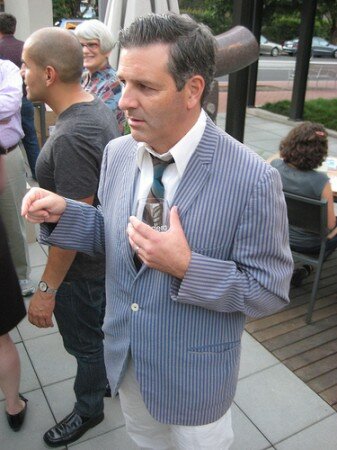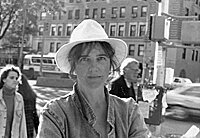Thomas Phillipson, director of the Northwest Filmmakers’ Festival, and curator of Top Down: Rooftop Cinema, NWFC’s outdoor summer screening series.
Anne Richardson: There’s an explosion of independent film coming out of Portland. What do you make of this? What’s your assessment of why Portland wound up with such a fertile scene?
Thomas Phillipson: The big bang in filmmaking happened years ago when digital video brought the art and craft of filmmaking to the people. That created a sort of “Why Not Me? Generation” in the 90’s that discovered in a hurry that the barriers to starting your own band or making your own movie had never been lower. Portland had an infrastructure to make the most of this—an existing community of filmmakers and the resources that had supported them which organically ramped up to accommodate the new voices. There were some key successes that brought attention to Portland—Gus Van Sant, Oscars for Will Vinton and Joan Gratz, high profile music videos by Jim Blashfield, but (at the same time) there has also been a prevailing lack of commercial ambition that has allowed filmmakers to experiment with modest expectations and to find satisfaction in the process of filmmaking. This has created many great works of personal expression, and that is, consequently, the closest thing I can find to prevailing theme of Northwest filmmaking.
Anne Richardson: Do you see NWFC as having played a role? How would you describe that role?
Thomas Phillipson: The Film Center has been a place for the community to gather, learn, share, and show for 40 years and that’s had an undeniable impact on where the scene is now. The Film Center’s role can change for every person who walks through the door—they may want to affordably rent equipment, learn digital editing, show their latest experimental short, hand process some Super 8 film, see Cassavetes on the big screen, meet their next cinematographer, intern for one of our Festivals, bring a filmmaker to their school to teach kids that filmmaking is an accessible means of expression—the list goes on. As for providing a screening venue for local work, the landscape has changed since the Center was founded and now there’s a film festival or backyard screening practically every weekend in Portland. Today, by the very nature of being here this long and keeping the curatorial bar high on the work we program, the Film Center has a unique ability to elevate the status of the region’s best work—though we still offer quarterly Open Screenings where anything goes.
Anne Richardson: The Northwest Film & Video Festival is now called the Northwest Filmmakers’ Festival. Why?
Thomas Phillipson: When the Northwest Film & Video Festival was launched in 1973, recognition of video as an art form was not a mainstream idea and so it offered a fresh edge to the Festival. With the proliferation of digital technology toward the turn of the century, video started to sound rather quaint and not so forward looking. After briefing our friends at the creative agency Leopold Ketel that the Festival’s unique character is that it was created for the filmmakers, serves the filmmakers first and that all our messaging should be focused on speaking to the filmmakers, they pitched to us the idea of changing the name to the Northwest Filmmakers’ Festival, to which I responded with some form of the phrase “oh hell yes.”
The Northwest Fest doesn’t charge filmmakers an entry fee, offers a free user-organized Barcamp film conference, hooks filmmakers up with Production Service Awards to use on their next project, puts them up in sponsoring hotels in Portland, shows their work to the world and to each other in a state of the art theater, and pays honoraria for features and for shorts included in the Best of the Northwest touring program.
Anne Richardson: Have you noticed any change in the number/type/quality of films submitted?
Thomas Philiipson: Since the mid-90’there have been around 400 films submitted each year—some of which just show up in the mail, but most I actively seek out. After over a decade of watching every single entry, I notice interesting motifs that surge and ebb year after year—one year we get a slew of political films, another it’s dialog-free narratives, one year it was the still baffling rash of unflattering full-frontal nudity— but during my tenure, there is a consistency of quality and variety coming directly from the filmmakers that always excites me, especially when I start putting together the shorts programs. While there are many standout films looking back, the work seems to get better and better each year. That might just be the appeal of the new for me, but the fact that each year I can find in the films new ideas and/or new ways of conveying familiar ideas, testifies to some sort of progress or evolution.
Anne Richardson: Thank you, Thomas!
==========================================
Still trying to figure out “why Portland?” for independent film? Portland Monthly’s Film Family Tree provides some helpful clues, including the origin story for the Northwest Film Center, where Thomas first studied filmmaking, and now serves as Regional Coordinator.



0 responses so far ↓
There are no comments yet...Kick things off by filling out the form below.
Leave a Comment